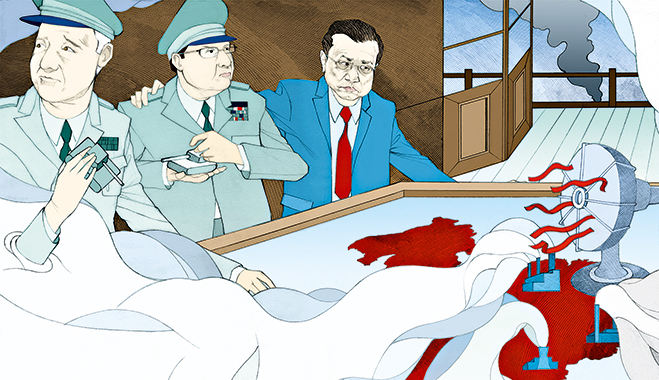
In the spring of 2014, Li Keqiang finally took to the stage and declared a “war on pollution”, describing the smog that had enveloped China’s major cities as “nature’s red-light warning against inefficient and blind development.”
Here the premier finally acknowledged the challenges facing China’s mask-wearing millions, and took on board widespread criticisms of the country’s inaction on climate change. This said, likening the government’s anti-pollution drive to a war brings to mind certain connotations, some of which are unhelpful, given the gulf that exists between the country’s military and environmental spending.
A brief look at China’s environmental budget shows that the country’s leadership is perhaps not as committed to fighting pollution as it is to making military threats
Undeterred by cuts in the western world, China’s military budget for 2014 amounted to a cool $132bn, which was 12.2 percent greater than in 2013, despite headline economic growth clocking in at a modest 7.5 percent. In fact, Chinese military spending has exhibited double-digit growth in each of the past 20 years and amounted to one of the most impressive budgets of its kind worldwide.
As a means for comparison, the country’s military expenditure was second only to the US in 2013, and more than double the size of third placed Russia – a measly $85bn. Home to advanced warships, fighter jets, cyber weapons and even drones, China has pumped billions into a military modernisation programme designed to bring the country’s might up to par with its more developed counterparts.
A brief look at China’s environmental budget shows that the country’s leadership is perhaps not as committed to fighting pollution as it is to making military threats. In 2013, the government’s environmental spend, at only $30bn, was down 10 percent on the year previous, according to a budget report seen at the country’s annual parliamentary gathering. Meanwhile, the $34bn dedicated to fighting environmental catastrophe in 2014 is poles apart from the sum set aside for defence.
Budget battle
Granted, a military budget of China’s size is far from unusual for a country of close to 1.5 billion people, though the chasm that exists between defence and environmental spending serves to illustrate exactly how much of a war on pollution we are actually seeing.
Clearly the phrase ‘war on pollution’ itself wasn’t intended to be taken literally, though the idea that climate change is a challenge similar in scale to an all-out war is one that shouldn’t be dismissed so lightly. And for as long as the state refuses to back its war with a war-like budget, criticisms of the government’s inaction on climate change will remain.
Conventional wisdom stipulates that military and defence spending makes up a sizeable share of any country’s budget, and that environmental considerations fall far behind in line.
However, the extent of China’s pollution problem merits that an exception be made to the rule. Look out onto any of the country’s major metropolises and there sits as visible a reminder as you’re ever likely to see that the country’s head-lunge into industrialisation has not been without consequence. Of the many problems ignited by China’s overzealous expansion bid, pollution is perhaps the worst, if not the costliest, in terms of public health, not to mention the financial implications environmental degradation has brought for its economy.
Figures released by the World Bank in 2008 showed that nine percent of national GDP was lost to environmental degradation in only that year, whereas a 2005 study by MIT found that the same issue had cost over $100bn in lost productivity – up from $22bn in 1975. More recently, findings released by the Chinese Academy of Environmental Planning, an organisation linked to the Ministry of Environmental Protection, stated that environmental degradation had cost China $230bn in 2010, representing a threefold increase on 2004. Yet the biggest wake-up call came last year, when the Chinese Academy of Environmental Planning asserted that environmental degradation and pollution had cost the economy $9.3trn in lost GDP.
Switching focus
Approximately three and half decades ago, China’s decade-long cultural revolution left the country in tatters, leaving its inspired leaders to focus on economic development and a road to rapid growth. GDP expansion has since sat at the forefront of the country’s strategic considerations, and China has turned from a country worth $59bn in 1978 to one worth over $9.2trn as of 2013, according to the World Bank. Now, in 2015, the time has finally come to do away with the rapid growth mentality and take into account how the country might achieve more sustainable gains.
Uninhibited energy consumption and a rising population have together given rise to new challenges – not so much in relation to economic growth but in sustaining the pace of development that has been thrust upon it. On the one hand, policymakers mustn’t stray too far from the rate of expansion posted in previous years, so as not to appear a dwindling investment prospect, but, on the other, they must introduce a greater measure of sustainability to proceedings.
Growth at all costs
The thick fog of pollution clouding China’s major cities and the legion of facemask-wearing city dwellers are proof, if ever it were needed, that the scales have been tilting in favour of the growth-at-all-costs approach for too long, though it’s high time policymakers arrived at a trade-off between environmental protection and economic gains.
If the world’s number two economy is to finally realise a greater measure of sustainable prosperity, it must first see pollution for what it is and acknowledge the crippling implications it is having on its economic and social wellbeing. And though some might see Li’s declaration of war on pollution as nothing more than headline fodder, the financial costs of environmental degradation are comparable to a war, and so, the solution worthy of the same budget.


